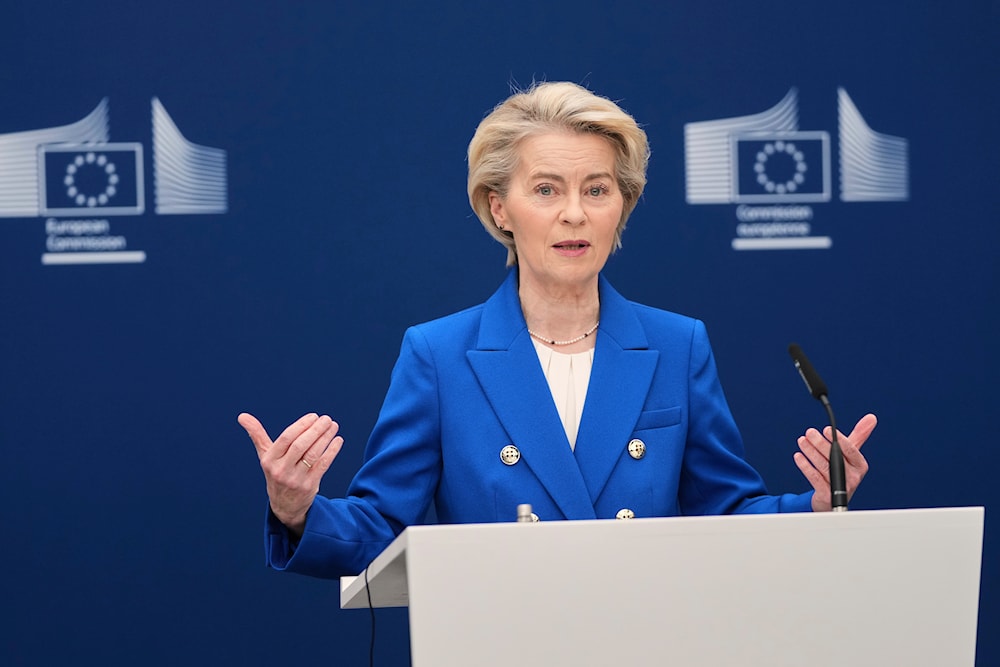EU Commission proposes joint borrowing as part of Euro defence plan
The European Union's announcement comes amid intensified European efforts to back Ukraine in its war against Russia, following the US withdrawal from aiding Kyiv.
-

European Commission President Ursula von der Leyen speaks during a media conference on the defense package at EU headquarters in Brussels, Tuesday, March 4, 2025 (AP)
European Commission President Ursula von der Leyen said European nations could mobilize billions of Euros as part of the EU's plans to bolster Europe's defense industry.
According to von der Leyen, the European Union could generate 800 billion Euros (841.1 billion USD) through its proposal, giving member states more monetary leeway for defense investments and loans worth 150 billion euros for these investments. The proposal would also mobilize private capital.
This announcement closely follows US President Donald Trump's pause on military aid to Ukraine, which includes US shipments of weaponry and equipment, including those in transit areas in Poland, prompting the Ukrainian parliament to respond.
Ukrainian Parliament addresses Trump
Following Trump's decision, the Ukrainian parliament welcomed US President Donald Trump's peace initiatives to resolve the Russo-Ukraine conflict, expressing confidence in his ability to help end hostilities in a statement released on March 4 in which lawmakers emphasized the Ukrainian people's strong desire for peace and belief that Trump's efforts could be crucial for Ukraine, Europe, and the world.
"The Ukrainian people long for peace more than anyone and believe that President Donald Trump's personal involvement and peace efforts will be crucial in swiftly bringing an end to the conflict and securing peace for Ukraine, Europe, and the world. The Verkhovna Rada of Ukraine supports President Trump's initiatives to initiate negotiations toward a peaceful resolution," the statement read.
US-Ukraine fallout
The United States and Ukraine are facing a diplomatic rift following Ukrainian President Zelensky's visit to the White House, during which he got into an argument with US President Trump and his vice president, JD Vance on February 28.
Trump had invited Zelensky to the White House to have lunch and hold a joint press conference, however, the two presidents started accusing each other of sharp allegations in front of reporters in the Oval Office.
A White House official blamed Zelensky for the argument, telling Axios that "He (Zelensky) could have just acknowledged the vice president's remarks and moved on, but he couldn't bring himself to do it," in reference to JD Vance's remarks regarding the need for diplomacy with Russia.
The United States and Ukraine were expected to sign a much-anticipated minerals deal that could pave the way for a US-brokered ceasefire between Kyiv and Moscow, however, Secretary of State Marco Rubio and National Security Advisor Mike Waltz told the Ukrainian delegation that they must leave.
Europe interferes
UK Prime Minister Keir Starmer welcomed Ukrainian President Volodymyr Zelensky to his Downing Street office on March 1, where they held a closed-door meeting, a day after Zelensky's tense exchange with US President Donald Trump.
European leaders congregated on March 2 for emergency talks, where the British PM revealed that his country, France, and "one or two" other countries are cooperating with Ukraine on a plan to end the war between Kyiv and Moscow.
"The United Kingdom, along with France and possibly one or two others, will work with Ukraine on a plan to stop the fighting, and then we'll discuss that plan with the United States," Starmer said.

 3 Min Read
3 Min Read









